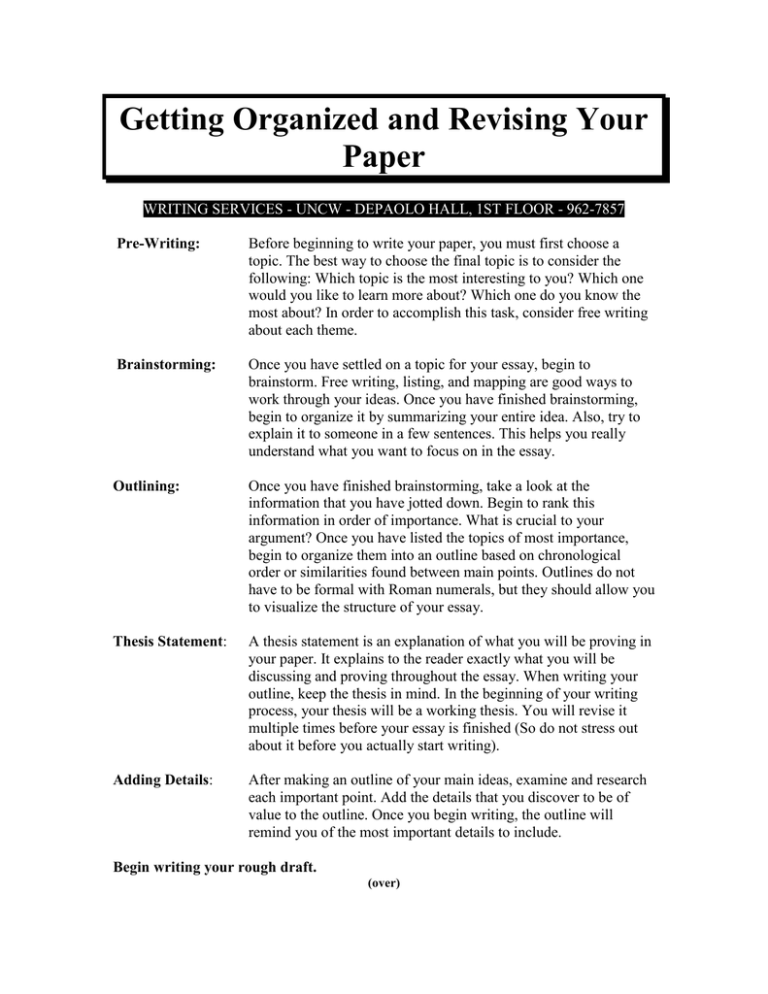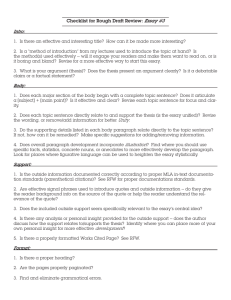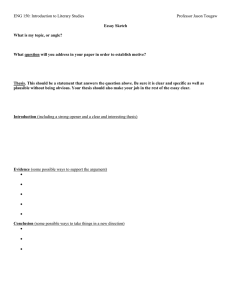Getting Organized and Revising Your Paper
advertisement

Getting Organized and Revising Your Paper WRITING SERVICES - UNCW - DEPAOLO HALL, 1ST FLOOR - 962-7857 Pre-Writing: Before beginning to write your paper, you must first choose a topic. The best way to choose the final topic is to consider the following: Which topic is the most interesting to you? Which one would you like to learn more about? Which one do you know the most about? In order to accomplish this task, consider free writing about each theme. Brainstorming: Once you have settled on a topic for your essay, begin to brainstorm. Free writing, listing, and mapping are good ways to work through your ideas. Once you have finished brainstorming, begin to organize it by summarizing your entire idea. Also, try to explain it to someone in a few sentences. This helps you really understand what you want to focus on in the essay. Outlining: Once you have finished brainstorming, take a look at the information that you have jotted down. Begin to rank this information in order of importance. What is crucial to your argument? Once you have listed the topics of most importance, begin to organize them into an outline based on chronological order or similarities found between main points. Outlines do not have to be formal with Roman numerals, but they should allow you to visualize the structure of your essay. Thesis Statement: A thesis statement is an explanation of what you will be proving in your paper. It explains to the reader exactly what you will be discussing and proving throughout the essay. When writing your outline, keep the thesis in mind. In the beginning of your writing process, your thesis will be a working thesis. You will revise it multiple times before your essay is finished (So do not stress out about it before you actually start writing). Adding Details: After making an outline of your main ideas, examine and research each important point. Add the details that you discover to be of value to the outline. Once you begin writing, the outline will remind you of the most important details to include. Begin writing your rough draft. (over) Revising Your Paper: Steps to a Polished Piece of Writing: So, you’ve finished your paper, and it’s ready to turn in—well, not quite. Before you have successfully completed your essay you must revise it. No essay is ready to be turned in after only one draft. Everyone makes mistakes; therefore, each essay must be revised multiple times. Take a Break: After finishing a draft, take a break and clear your mind. Do not begin to revise until you have separated yourself from the paper. This will help you to approach the paper objectively. Read the Paper Out Loud: This will help you catch mistakes, both small and large. Point to each word as you read. Make an appointment at the Writing Center. The peer tutor will be able to provide constructive feedback on the essay. Revise the Content: Ask yourself: Does the essay have a clear, strong thesis? Do all of my main ideas relate directly to the thesis? Have I adequately included examples and details to support each main idea? Does my paper analyze, rather than summarize? Do I have a clear introduction and conclusion? Revise the Organization: Ask yourself: Do I have appropriate transitions between paragraphs and sentences? Are my points organized in a way that makes sense? Do my words and ideas flow together appropriately? Take a Closer Look: Ask yourself: Are my ideas in a logical order? Does each paragraph have a clearly defined main idea? Does each paragraph contain details to support its main idea? Does each paragraph have a strong concluding sentence? Does each paragraph support my thesis statement? Are my word choices appropriate for the audience? Do I have any redundancy or repetitiveness within the essay? After revising the content of your paper, read it out loud again. This time check for grammatical and careless errors. Also look for punctuation and spelling mistakes. Once you have completed all the steps needed to successfully revise your work, you are ready to turn in your paper. Created by: Neeley Gossett Modified by: Jamie Joyner June 2013





